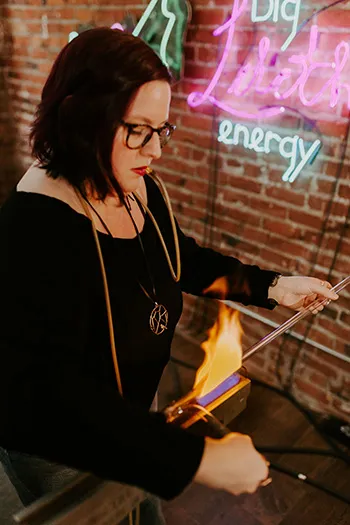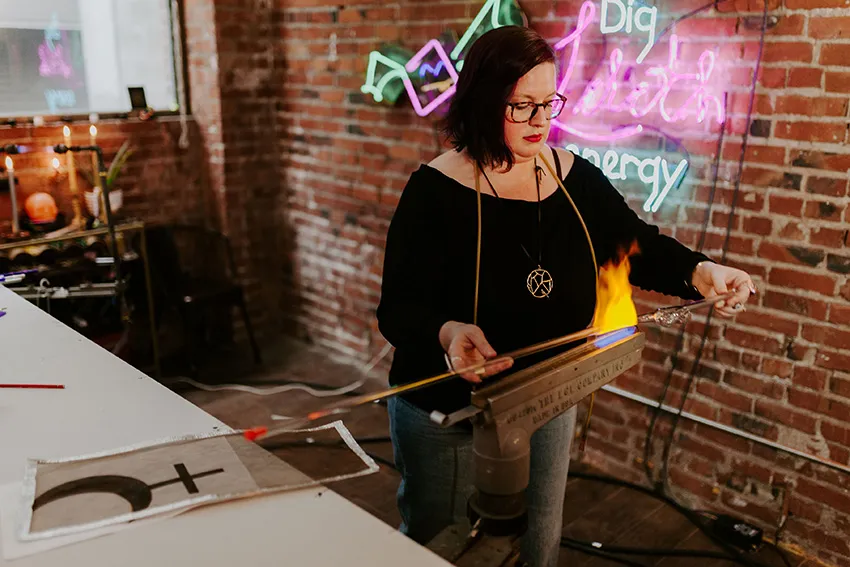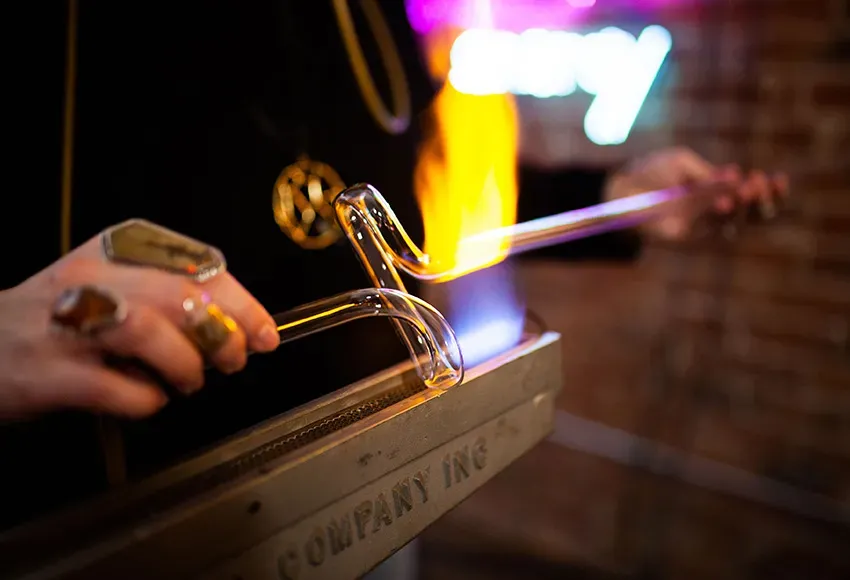
When she's not bending glass tubes with an open flame to create glowing art pieces, Alleson Buchanan manages her woman-owned-and-operated studio, Radiant Neon. The studio is part of Seattle's larger neon culture, which is most visible at iconic landmarks, like the Elephant Car Wash sign.
In recent years, the community's focus has shifted to a reinvigorated appreciation for neon bending as art as opposed to signage, Buchanan says.
"The art side of the sign-making is what's captured people," Buchanan said. "While we all love signage, transitioning it into the art world has made people go, 'Oh, that's an interesting medium.'"
Glassblowing's influence
Seattle houses multiple neon benders, according to Buchanan, with at least 10 others in Seattle and 5–10 in Tacoma. She credits neon's success in the region to the infrastructure glassblowing has provided.

"It's a glass city," Buchanan said. "The glass influence [here] has allowed a foundation for neon to thrive. People are familiar with glass, and neon is definitely glass work, but it's kind of adjacent in the way that we work with, it because we aren't working with molten glass."
The glass experience called "Refract" has taken place in Seattle for the past four years, and Buchanan has participated in it. She thinks that the glass community is beginning to recognize neon as part of its umbrella. For example, Washington's Pilchuck Glass School, founded by Dale Chihuly, held an event titled "Neon Symposium" this year.
"[Neon] was kind of like the stepchild for a while." Buchanan said. "We're kind of being recognized as also pushing the glass medium."
Neon-tinted nostalgia
When the decision to donate the bigger of two Elephant Car Wash signs to the Museum of History and Industry (MOHAI) was made, the Seattle Times reported on a protest by Friends of Historic Belltown, who asked the city to make it a landmark instead. The smaller of the two signs is a landmark owned by Amazon, and the bigger sign is still in MOHAI's possession. Both have undergone restoration efforts.
Matt Hucke wrote Seattle Neon: Signs of the Emerald City, a book full of photographs of neon signs in Seattle, paired with their history or that of the business they're attached to. He says he always got warm responses from online groups when he posted progress updates.
"I would hear about how they had seen these signs, [how] they'd grown up with them since their childhood, like the Elephant Car Wash," Hucke said. "You'd be ... maybe visiting relatives in the suburbs as a child, going to grandma's house, and you come back into the city and the elephant's right there to welcome you home."
Buchanan says there's a lot of comfort in neon, and that it holds the memory of the community surrounding it. Having grown up in Oregon, Buchanan has fond memories of such a sign that used to say "White Stag" but was changed to say "Portland Oregon."
"Every time it changed, people are like, 'No, you can't change the neon sign.' It has this way of being a constant," Buchanan said.
Not every neon sign has received the restoration efforts the Elephant Car Wash signs did. Bardahl Oil's sign was one of the first Hucke wanted to photograph for his book. When he arrived, he found out it had died a few months prior.
"When I contacted the company, they said it would cost something like $100,000 to repair, because the whole structure is rickety and it's not safe to get up there," Hucke said.
Access to the neon world
The signs are also expensive to make. Buchanan says the niche is what makes it so.
"I don't control my supplier cost. The glass alone ranges and costs wildly," she said.
Learning how to bend neon can also prove challenging. Neon shops traditionally have an apprentice program. That's changed in the last seven years, according to Buchanan, but hers offers classes, and she's proud to be part of the community shift.
"There [were] a lot of secrets, a lot of 'we don't share out styles, we only teach our apprentices,'" Buchanan said.
As for Hucke, he hopes his book will stimulate some interest in neon.
"There was a low point. We're kind of coming back from that," he said.


